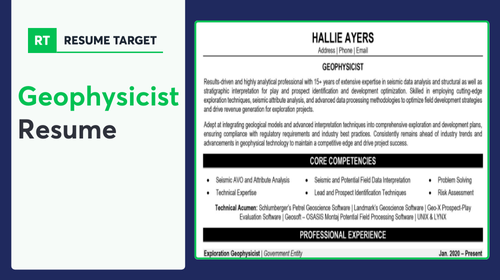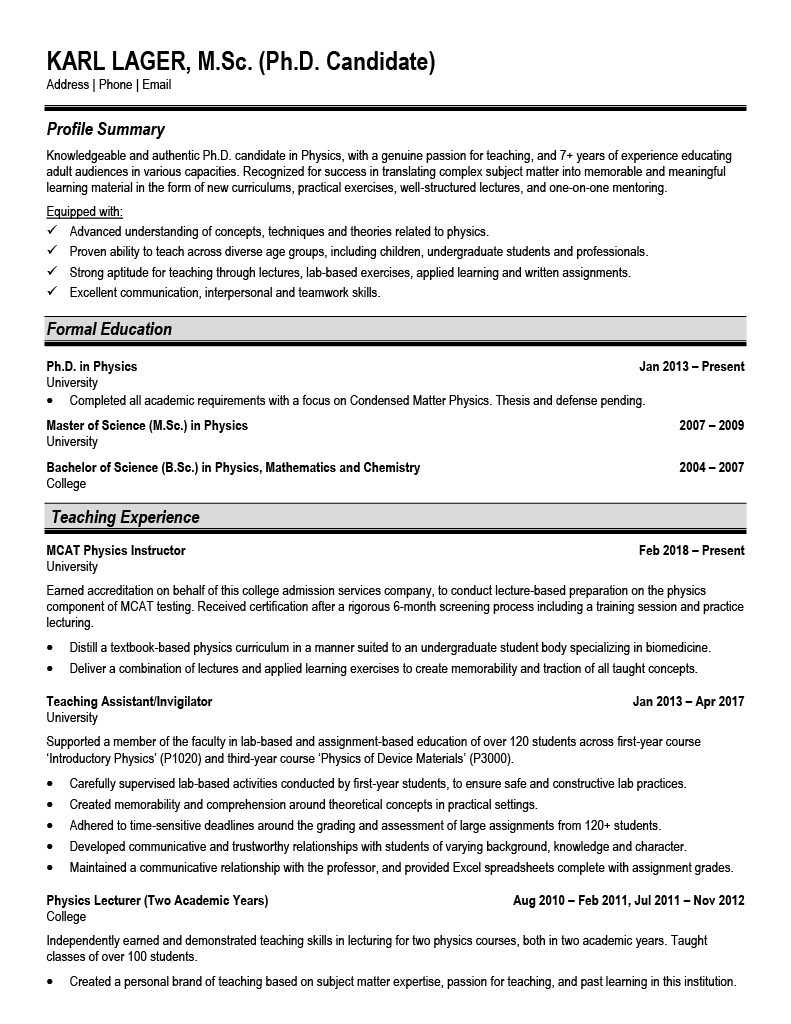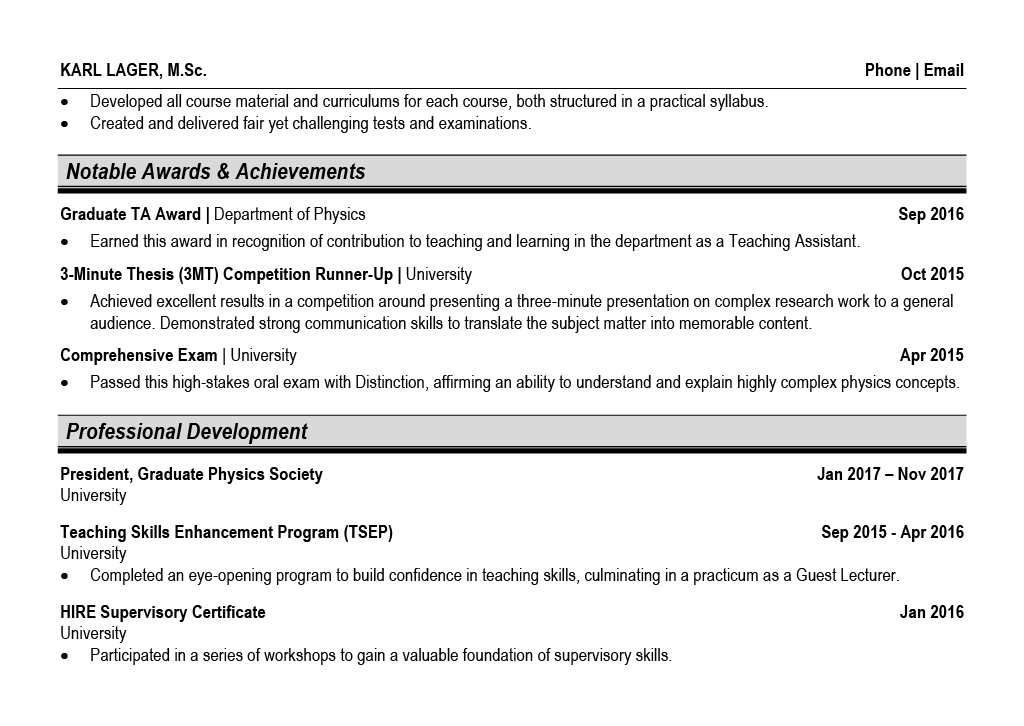

Translating complex seismic data into a compelling career story stumps even the brightest geophysicists. Your technical expertise is vast, but conveying it effectively on paper requires a different kind of precision.
Are you struggling to showcase both your analytical abilities and field experience in a way recruiters understand? A well-crafted resume bridges the gap between complex geophysical concepts and clear business value, making your expertise impossible to ignore.
Resume Target specializes in helping geophysicists transform technical achievements into powerful career narratives. We'll help you create a resume that speaks both to technical directors and HR professionals, positioning you perfectly for your next career move.


At the intersection of Earth science and physics, geophysicists are the scientific detectives who unlock our planet's hidden secrets, using advanced technology to locate valuable natural resources like oil, gas, and mineral deposits that power our modern world.
These Earth scientists combine sophisticated tools and techniques - from seismic surveys to electromagnetic measurements - to create detailed maps of what lies beneath the surface, helping companies and governments make informed decisions about resource exploration while also monitoring potential natural hazards.
If you're fascinated by both the practical and theoretical aspects of Earth science, a career as a geophysicist offers diverse opportunities for growth - whether you're interested in working with energy companies, environmental agencies, or research institutions that are shaping our understanding of the planet.
Let's talk about what's exciting in the world of geophysicist compensation! Your career path as a geophysicist offers impressive earning potential that grows substantially with experience and specialized expertise. And guess what? The field rewards your professional growth with increasingly attractive compensation packages.
Figures from: U.S. Bureau of Labor Statistics
As a Geophysicist, your career path offers diverse opportunities from technical specialization to leadership roles. The journey typically progresses from field work to senior management, with options for global mobility and consultancy.
Beyond foundational geological knowledge, advancing in geophysics requires a powerful combination of technical expertise and leadership capabilities.
- Advanced seismic data processing and interpretation - Geophysical modeling software proficiency - Project management and risk assessment - Cross-functional team leadership and stakeholder communicationLaunch your geophysicist career by combining a strong foundation in earth sciences with hands-on field experience, starting with a bachelor's degree in geophysics, geology, or a related field.
To advance in this field, you'll need to develop strong communication and technical skills, along with the ability to work effectively in team environments while solving complex geological challenges.
Requirements from Pulivarthi Group
From Texas oil fields to California's tech hubs, geophysicist roles span energy, engineering, and government sectors.
Figures from Zippia
Struggling to translate your field experience, research projects, and technical expertise into a compelling geologist resume that stands out to hiring managers? This comprehensive, section-by-section guide will show you exactly how to structure your resume and highlight your most relevant geological achievements.
As a geologist who can analyze complex geological formations and interpret vast amounts of field data, you might find it challenging to distill your extensive expertise into a few compelling sentences for your resume summary.
While you excel at mapping mineral deposits and conducting detailed site assessments, translating these technical skills into language that resonates with hiring managers requires a different kind of precision - one that showcases both your scientific knowledge and practical field experience in a way that immediately captures attention.
How would you characterize your expertise across different geological disciplines (e.g., structural geology, mineralogy, hydrogeology) and how do they collectively define your professional identity?
Reason: This helps you articulate your broad geological expertise while highlighting your specialized focus areas, allowing recruiters to quickly understand your professional scope and potential value to their organization.
What combination of field experience, technical skills, and analytical tools have you mastered that makes you particularly effective in geological interpretation and problem-solving?
Reason: This question helps you showcase your comprehensive skill set while emphasizing how you blend practical field experience with technical expertise - a crucial balance in modern geology roles.
How has your geological work contributed to broader business objectives, whether in resource exploration, environmental protection, or construction/engineering projects?
Reason: This helps you frame your geological expertise in terms of business impact, demonstrating to employers that you understand how your scientific work translates to organizational success and industry advancement.
As a geologist, you'll need to showcase both your technical expertise in geological analysis and field work alongside your practical research and reporting abilities.
Your skills section should balance specialized geological competencies like mineralogy and stratigraphy with essential tools like GIS software, data modeling, and field mapping techniques that employers look for in today's geological professionals.
Showcase your geological expertise by organizing your experience into three powerful sections: a concise role overview that sets the stage, quantifiable achievements that highlight your impact in the field, and core responsibilities that demonstrate your technical and analytical capabilities.
Many geologists struggle to translate complex field studies and technical analyses into clear, business-focused accomplishments that resonate with hiring managers. Transform your geological expertise into powerful achievements by connecting your field work, research, and analytical skills to measurable outcomes in resource discovery, risk mitigation, and project cost savings.
The responsibilities section demonstrates how you apply geological expertise to real-world challenges and discoveries. Your role description should help non-technical hiring managers understand how your work contributes to resource exploration, environmental protection, and project success.
Your geology credentials should highlight both your academic background and professional certifications, with special emphasis on any specialized training in mineralogy, stratigraphy, or geological mapping. Start with your highest degree and include any Professional Geologist (PG) licensure or similar certifications that demonstrate your expertise in geological assessment and field research.
Now that you've built a strong foundation using Resume Target's comprehensive resume writing guidelines, you're ready to transform your CV into a powerful tool for physics positions.
While many candidates focus solely on customizing their cover letters, tailoring your resume for specific physicist roles—whether in research, academia, or industry—is equally crucial for standing out in this competitive field.
A customized physicist resume not only navigates through ATS systems by incorporating role-specific keywords and technical competencies, but also demonstrates to hiring managers your precise alignment with their research focus, laboratory requirements, or institutional goals.
Ready to make your physics expertise shine? Let's transform your resume into a precision instrument that opens doors to your dream research or academic position!
Don't let a lack of work experience hold you back from launching your physics career! Your journey to becoming a Physicist can start with a powerful resume that showcases your academic achievements, laboratory experience, and research projects.
Focus on highlighting your technical skills, research capabilities, and analytical mindset to create a compelling resume that stands out.
For a detailed roadmap to crafting your resume, check out the Student Resume Writing Guide to learn how to best present your academic accomplishments and research experience.
Your physics degree has equipped you with an impressive foundation of analytical skills, research experience, and technical knowledge that employers are actively seeking.
Transform your academic achievements, laboratory work, and research projects into a compelling narrative that showcases your potential as a rising physicist.
"Detail-oriented and analytical Physicist with extensive research experience gained through undergraduate studies and laboratory internships. Demonstrated expertise in data analysis, quantum mechanics modeling, and advanced computational methods using Python and MATLAB. Successfully contributed to two published research papers as an undergraduate researcher, specializing in particle physics. Seeking to leverage strong theoretical foundation and hands-on research experience to drive innovation in experimental physics research."
Now's your chance to showcase the rigorous academic foundation that makes you a standout physicist - from advanced theoretical coursework to groundbreaking research projects!
Don't just list your degrees - highlight specific quantum mechanics courses, computational physics projects, or laboratory research experiences that demonstrate your expertise and passion for unlocking the mysteries of matter and energy.
See Question 1 AnswerRelevant Coursework: Quantum Mechanics | Statistical Physics | Electromagnetic Theory | Mathematical Methods in Physics | Particle Physics | Solid State Physics
Key Projects:
Quantum Computing Simulation Project: Developed and implemented a quantum algorithm simulation to study decoherence effects in multi-qubit systems. Successfully demonstrated reduced error rates in quantum gate operations.
High-Energy Particle Detection Research: Collaborated with a team of four researchers to design and implement a cosmic ray detection system using scintillator technology.
Leverage your academic background, laboratory experience, and technical expertise by showcasing the valuable skills you've developed through your physics coursework, research projects, and hands-on laboratory work.
As an entry-level Physicist, your combination of analytical skills and technical knowledge positions you well for roles in research institutions, technology companies, or government laboratories, where you can contribute to groundbreaking scientific discoveries and innovations.
When you're deep in quantum mechanics and theoretical research all day, it can feel impossible to translate your groundbreaking work into language that hiring managers outside your specialty can grasp and appreciate.
At Resume Target, we specialize in helping physicists like you transform complex research achievements into compelling career narratives that resonate with both technical and non-technical readers.
Our expert writers have helped countless physics professionals showcase their contributions to breakthrough research projects, securing positions at prestigious research institutions and innovative tech companies.
With major research funding cycles and academic hiring seasons approaching, now is the perfect time to ensure your resume matches your brilliant capabilities - let's connect today to craft your standout resume.
Impress any hiring manager with our Scientist resume writing service. We work with all career levels and types of Scientist professionals.
Learn More → Scientist Resume Writing Services